Management Principles Essay: Leadership vs. Management Roles Analysis
VerifiedAdded on 2023/06/07
|10
|2692
|480
Essay
AI Summary
This essay delves into the distinctions between organizational managers and leaders, addressing the debate of whether all managers need to be leaders. It explores the responsibilities and duties of managers, emphasizing their authority over resources and their role in employee performance. The essay contrasts this with the role of organizational leaders, who focus on influencing employees, building morale, and guiding the organization towards its goals. The discussion draws on various sources to highlight differences in communication, motivation, and the skills required for effective leadership. The essay also examines the qualities of effective leaders, such as vision, agility, and adaptability, and how these qualities contribute to organizational success. It concludes by emphasizing that while managers may sometimes exhibit leadership qualities, not all managers possess the necessary skills to be effective leaders, underscoring the unique contributions of leadership within an organization.
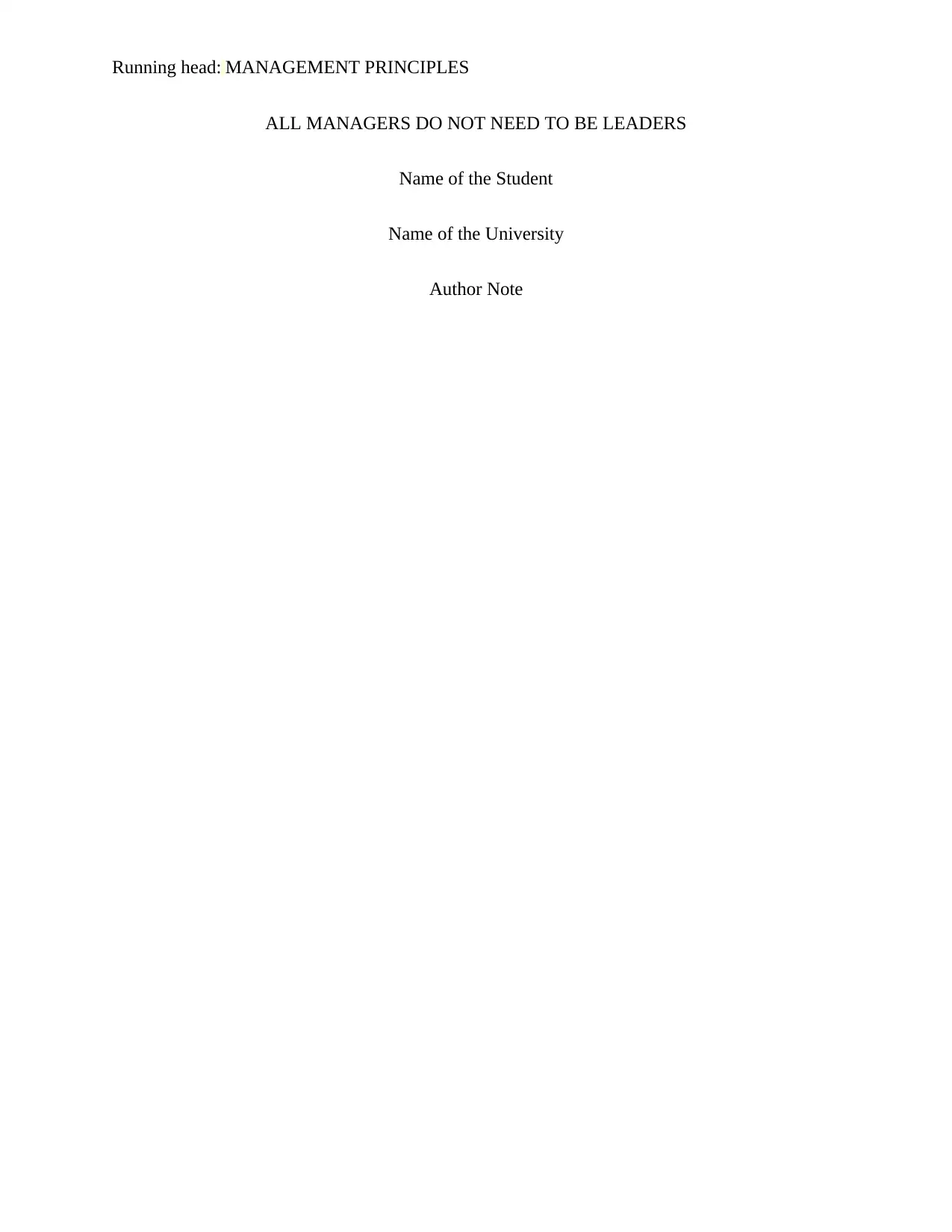
Running head: MANAGEMENT PRINCIPLES
ALL MANAGERS DO NOT NEED TO BE LEADERS
Name of the Student
Name of the University
Author Note
ALL MANAGERS DO NOT NEED TO BE LEADERS
Name of the Student
Name of the University
Author Note
Paraphrase This Document
Need a fresh take? Get an instant paraphrase of this document with our AI Paraphraser
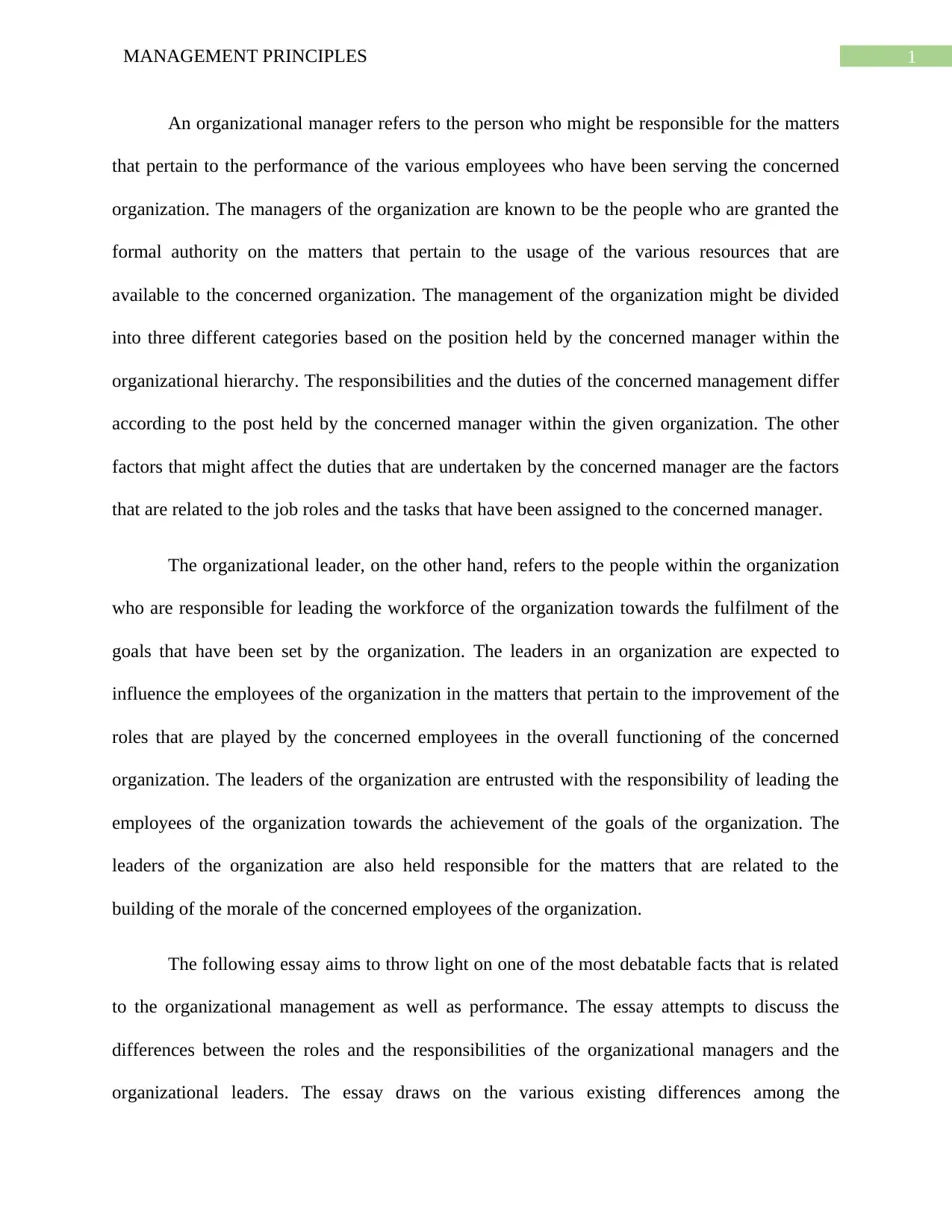
1MANAGEMENT PRINCIPLES
An organizational manager refers to the person who might be responsible for the matters
that pertain to the performance of the various employees who have been serving the concerned
organization. The managers of the organization are known to be the people who are granted the
formal authority on the matters that pertain to the usage of the various resources that are
available to the concerned organization. The management of the organization might be divided
into three different categories based on the position held by the concerned manager within the
organizational hierarchy. The responsibilities and the duties of the concerned management differ
according to the post held by the concerned manager within the given organization. The other
factors that might affect the duties that are undertaken by the concerned manager are the factors
that are related to the job roles and the tasks that have been assigned to the concerned manager.
The organizational leader, on the other hand, refers to the people within the organization
who are responsible for leading the workforce of the organization towards the fulfilment of the
goals that have been set by the organization. The leaders in an organization are expected to
influence the employees of the organization in the matters that pertain to the improvement of the
roles that are played by the concerned employees in the overall functioning of the concerned
organization. The leaders of the organization are entrusted with the responsibility of leading the
employees of the organization towards the achievement of the goals of the organization. The
leaders of the organization are also held responsible for the matters that are related to the
building of the morale of the concerned employees of the organization.
The following essay aims to throw light on one of the most debatable facts that is related
to the organizational management as well as performance. The essay attempts to discuss the
differences between the roles and the responsibilities of the organizational managers and the
organizational leaders. The essay draws on the various existing differences among the
An organizational manager refers to the person who might be responsible for the matters
that pertain to the performance of the various employees who have been serving the concerned
organization. The managers of the organization are known to be the people who are granted the
formal authority on the matters that pertain to the usage of the various resources that are
available to the concerned organization. The management of the organization might be divided
into three different categories based on the position held by the concerned manager within the
organizational hierarchy. The responsibilities and the duties of the concerned management differ
according to the post held by the concerned manager within the given organization. The other
factors that might affect the duties that are undertaken by the concerned manager are the factors
that are related to the job roles and the tasks that have been assigned to the concerned manager.
The organizational leader, on the other hand, refers to the people within the organization
who are responsible for leading the workforce of the organization towards the fulfilment of the
goals that have been set by the organization. The leaders in an organization are expected to
influence the employees of the organization in the matters that pertain to the improvement of the
roles that are played by the concerned employees in the overall functioning of the concerned
organization. The leaders of the organization are entrusted with the responsibility of leading the
employees of the organization towards the achievement of the goals of the organization. The
leaders of the organization are also held responsible for the matters that are related to the
building of the morale of the concerned employees of the organization.
The following essay aims to throw light on one of the most debatable facts that is related
to the organizational management as well as performance. The essay attempts to discuss the
differences between the roles and the responsibilities of the organizational managers and the
organizational leaders. The essay draws on the various existing differences among the
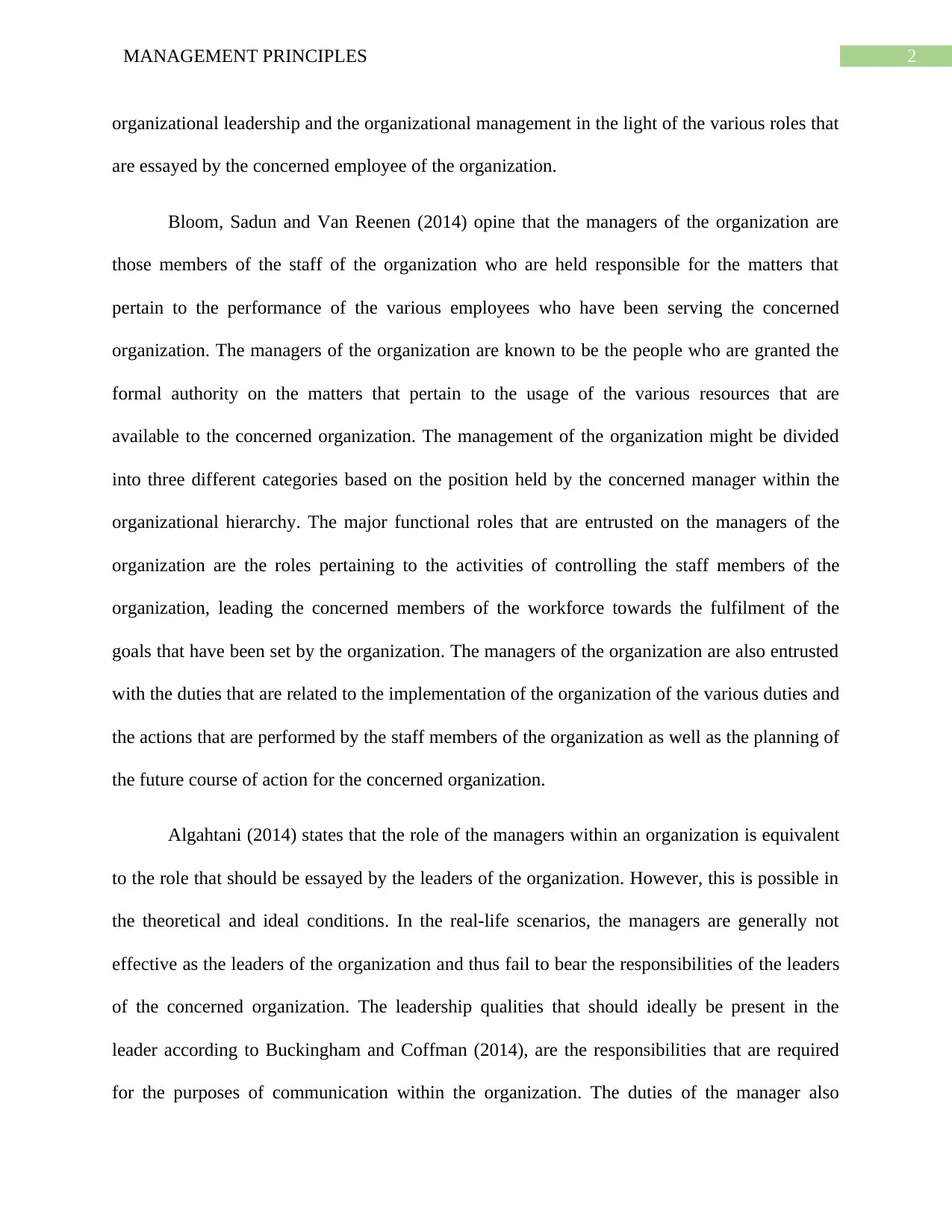
2MANAGEMENT PRINCIPLES
organizational leadership and the organizational management in the light of the various roles that
are essayed by the concerned employee of the organization.
Bloom, Sadun and Van Reenen (2014) opine that the managers of the organization are
those members of the staff of the organization who are held responsible for the matters that
pertain to the performance of the various employees who have been serving the concerned
organization. The managers of the organization are known to be the people who are granted the
formal authority on the matters that pertain to the usage of the various resources that are
available to the concerned organization. The management of the organization might be divided
into three different categories based on the position held by the concerned manager within the
organizational hierarchy. The major functional roles that are entrusted on the managers of the
organization are the roles pertaining to the activities of controlling the staff members of the
organization, leading the concerned members of the workforce towards the fulfilment of the
goals that have been set by the organization. The managers of the organization are also entrusted
with the duties that are related to the implementation of the organization of the various duties and
the actions that are performed by the staff members of the organization as well as the planning of
the future course of action for the concerned organization.
Algahtani (2014) states that the role of the managers within an organization is equivalent
to the role that should be essayed by the leaders of the organization. However, this is possible in
the theoretical and ideal conditions. In the real-life scenarios, the managers are generally not
effective as the leaders of the organization and thus fail to bear the responsibilities of the leaders
of the concerned organization. The leadership qualities that should ideally be present in the
leader according to Buckingham and Coffman (2014), are the responsibilities that are required
for the purposes of communication within the organization. The duties of the manager also
organizational leadership and the organizational management in the light of the various roles that
are essayed by the concerned employee of the organization.
Bloom, Sadun and Van Reenen (2014) opine that the managers of the organization are
those members of the staff of the organization who are held responsible for the matters that
pertain to the performance of the various employees who have been serving the concerned
organization. The managers of the organization are known to be the people who are granted the
formal authority on the matters that pertain to the usage of the various resources that are
available to the concerned organization. The management of the organization might be divided
into three different categories based on the position held by the concerned manager within the
organizational hierarchy. The major functional roles that are entrusted on the managers of the
organization are the roles pertaining to the activities of controlling the staff members of the
organization, leading the concerned members of the workforce towards the fulfilment of the
goals that have been set by the organization. The managers of the organization are also entrusted
with the duties that are related to the implementation of the organization of the various duties and
the actions that are performed by the staff members of the organization as well as the planning of
the future course of action for the concerned organization.
Algahtani (2014) states that the role of the managers within an organization is equivalent
to the role that should be essayed by the leaders of the organization. However, this is possible in
the theoretical and ideal conditions. In the real-life scenarios, the managers are generally not
effective as the leaders of the organization and thus fail to bear the responsibilities of the leaders
of the concerned organization. The leadership qualities that should ideally be present in the
leader according to Buckingham and Coffman (2014), are the responsibilities that are required
for the purposes of communication within the organization. The duties of the manager also
⊘ This is a preview!⊘
Do you want full access?
Subscribe today to unlock all pages.

Trusted by 1+ million students worldwide
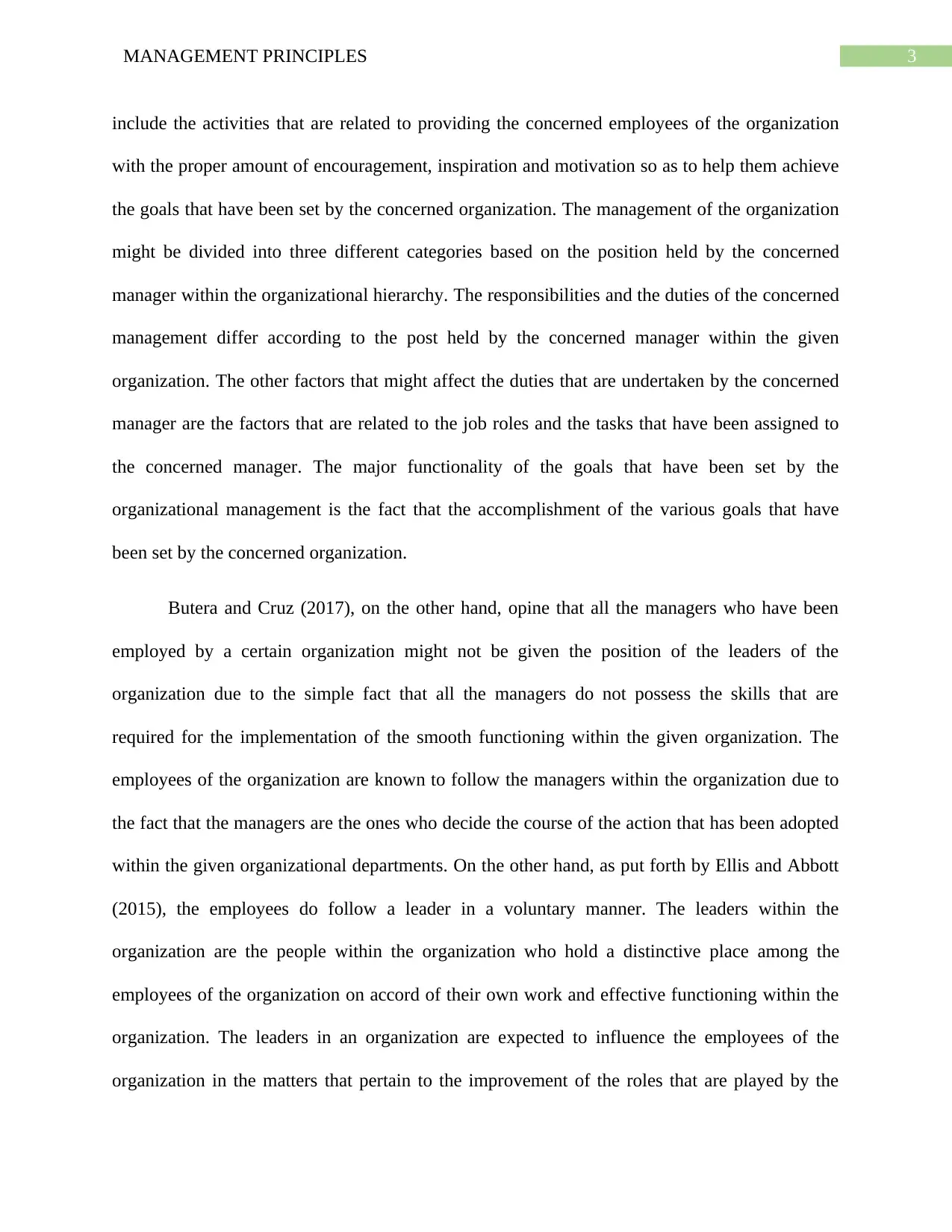
3MANAGEMENT PRINCIPLES
include the activities that are related to providing the concerned employees of the organization
with the proper amount of encouragement, inspiration and motivation so as to help them achieve
the goals that have been set by the concerned organization. The management of the organization
might be divided into three different categories based on the position held by the concerned
manager within the organizational hierarchy. The responsibilities and the duties of the concerned
management differ according to the post held by the concerned manager within the given
organization. The other factors that might affect the duties that are undertaken by the concerned
manager are the factors that are related to the job roles and the tasks that have been assigned to
the concerned manager. The major functionality of the goals that have been set by the
organizational management is the fact that the accomplishment of the various goals that have
been set by the concerned organization.
Butera and Cruz (2017), on the other hand, opine that all the managers who have been
employed by a certain organization might not be given the position of the leaders of the
organization due to the simple fact that all the managers do not possess the skills that are
required for the implementation of the smooth functioning within the given organization. The
employees of the organization are known to follow the managers within the organization due to
the fact that the managers are the ones who decide the course of the action that has been adopted
within the given organizational departments. On the other hand, as put forth by Ellis and Abbott
(2015), the employees do follow a leader in a voluntary manner. The leaders within the
organization are the people within the organization who hold a distinctive place among the
employees of the organization on accord of their own work and effective functioning within the
organization. The leaders in an organization are expected to influence the employees of the
organization in the matters that pertain to the improvement of the roles that are played by the
include the activities that are related to providing the concerned employees of the organization
with the proper amount of encouragement, inspiration and motivation so as to help them achieve
the goals that have been set by the concerned organization. The management of the organization
might be divided into three different categories based on the position held by the concerned
manager within the organizational hierarchy. The responsibilities and the duties of the concerned
management differ according to the post held by the concerned manager within the given
organization. The other factors that might affect the duties that are undertaken by the concerned
manager are the factors that are related to the job roles and the tasks that have been assigned to
the concerned manager. The major functionality of the goals that have been set by the
organizational management is the fact that the accomplishment of the various goals that have
been set by the concerned organization.
Butera and Cruz (2017), on the other hand, opine that all the managers who have been
employed by a certain organization might not be given the position of the leaders of the
organization due to the simple fact that all the managers do not possess the skills that are
required for the implementation of the smooth functioning within the given organization. The
employees of the organization are known to follow the managers within the organization due to
the fact that the managers are the ones who decide the course of the action that has been adopted
within the given organizational departments. On the other hand, as put forth by Ellis and Abbott
(2015), the employees do follow a leader in a voluntary manner. The leaders within the
organization are the people within the organization who hold a distinctive place among the
employees of the organization on accord of their own work and effective functioning within the
organization. The leaders in an organization are expected to influence the employees of the
organization in the matters that pertain to the improvement of the roles that are played by the
Paraphrase This Document
Need a fresh take? Get an instant paraphrase of this document with our AI Paraphraser
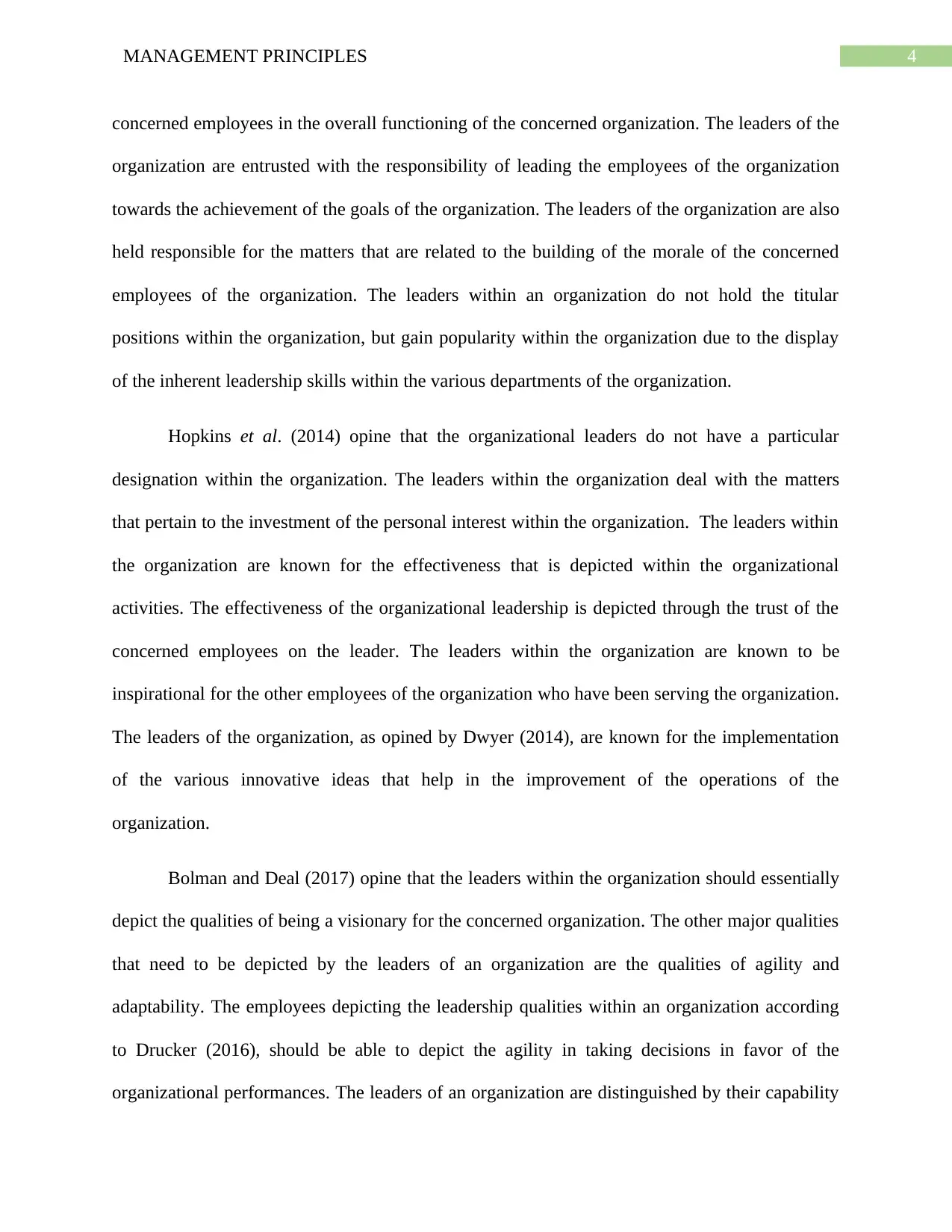
4MANAGEMENT PRINCIPLES
concerned employees in the overall functioning of the concerned organization. The leaders of the
organization are entrusted with the responsibility of leading the employees of the organization
towards the achievement of the goals of the organization. The leaders of the organization are also
held responsible for the matters that are related to the building of the morale of the concerned
employees of the organization. The leaders within an organization do not hold the titular
positions within the organization, but gain popularity within the organization due to the display
of the inherent leadership skills within the various departments of the organization.
Hopkins et al. (2014) opine that the organizational leaders do not have a particular
designation within the organization. The leaders within the organization deal with the matters
that pertain to the investment of the personal interest within the organization. The leaders within
the organization are known for the effectiveness that is depicted within the organizational
activities. The effectiveness of the organizational leadership is depicted through the trust of the
concerned employees on the leader. The leaders within the organization are known to be
inspirational for the other employees of the organization who have been serving the organization.
The leaders of the organization, as opined by Dwyer (2014), are known for the implementation
of the various innovative ideas that help in the improvement of the operations of the
organization.
Bolman and Deal (2017) opine that the leaders within the organization should essentially
depict the qualities of being a visionary for the concerned organization. The other major qualities
that need to be depicted by the leaders of an organization are the qualities of agility and
adaptability. The employees depicting the leadership qualities within an organization according
to Drucker (2016), should be able to depict the agility in taking decisions in favor of the
organizational performances. The leaders of an organization are distinguished by their capability
concerned employees in the overall functioning of the concerned organization. The leaders of the
organization are entrusted with the responsibility of leading the employees of the organization
towards the achievement of the goals of the organization. The leaders of the organization are also
held responsible for the matters that are related to the building of the morale of the concerned
employees of the organization. The leaders within an organization do not hold the titular
positions within the organization, but gain popularity within the organization due to the display
of the inherent leadership skills within the various departments of the organization.
Hopkins et al. (2014) opine that the organizational leaders do not have a particular
designation within the organization. The leaders within the organization deal with the matters
that pertain to the investment of the personal interest within the organization. The leaders within
the organization are known for the effectiveness that is depicted within the organizational
activities. The effectiveness of the organizational leadership is depicted through the trust of the
concerned employees on the leader. The leaders within the organization are known to be
inspirational for the other employees of the organization who have been serving the organization.
The leaders of the organization, as opined by Dwyer (2014), are known for the implementation
of the various innovative ideas that help in the improvement of the operations of the
organization.
Bolman and Deal (2017) opine that the leaders within the organization should essentially
depict the qualities of being a visionary for the concerned organization. The other major qualities
that need to be depicted by the leaders of an organization are the qualities of agility and
adaptability. The employees depicting the leadership qualities within an organization according
to Drucker (2016), should be able to depict the agility in taking decisions in favor of the
organizational performances. The leaders of an organization are distinguished by their capability
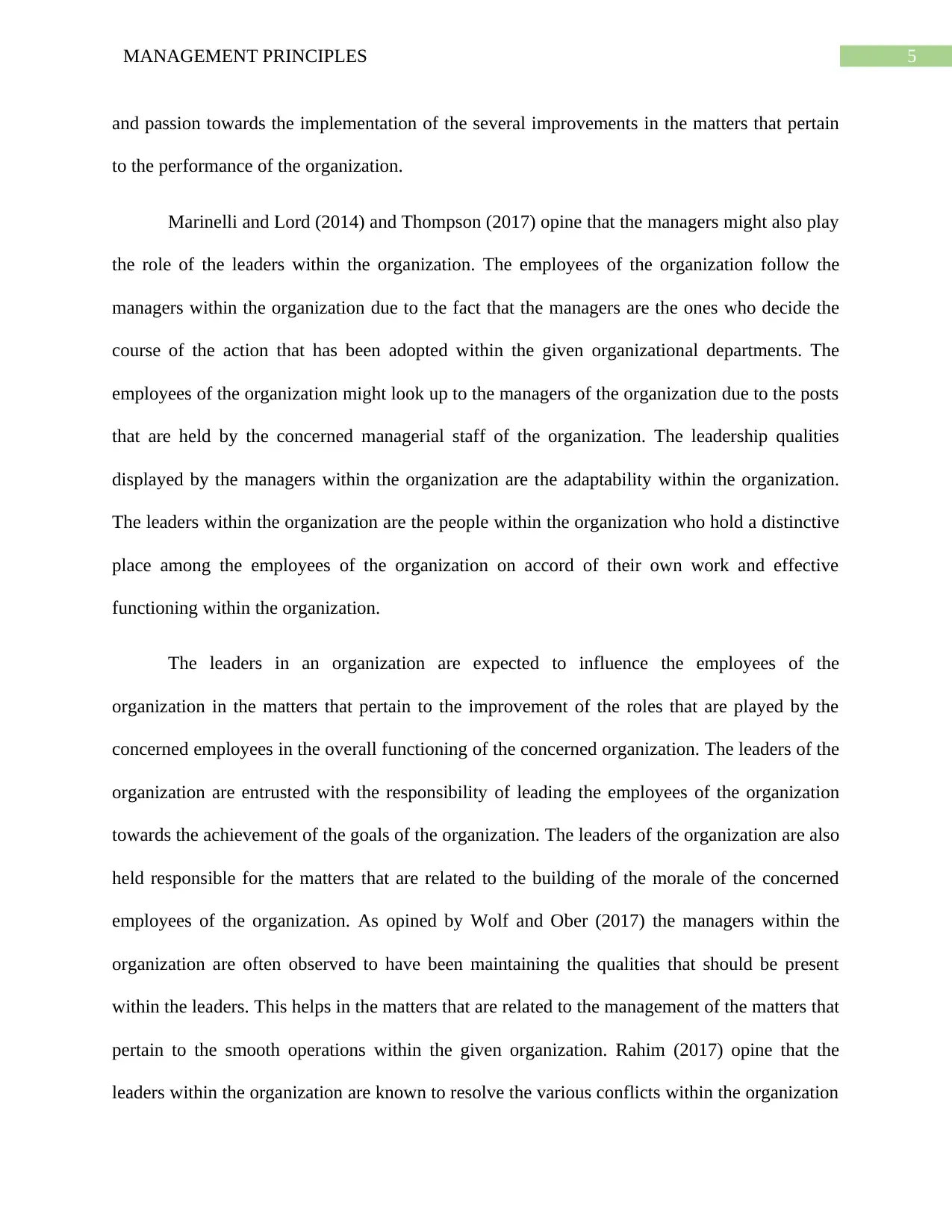
5MANAGEMENT PRINCIPLES
and passion towards the implementation of the several improvements in the matters that pertain
to the performance of the organization.
Marinelli and Lord (2014) and Thompson (2017) opine that the managers might also play
the role of the leaders within the organization. The employees of the organization follow the
managers within the organization due to the fact that the managers are the ones who decide the
course of the action that has been adopted within the given organizational departments. The
employees of the organization might look up to the managers of the organization due to the posts
that are held by the concerned managerial staff of the organization. The leadership qualities
displayed by the managers within the organization are the adaptability within the organization.
The leaders within the organization are the people within the organization who hold a distinctive
place among the employees of the organization on accord of their own work and effective
functioning within the organization.
The leaders in an organization are expected to influence the employees of the
organization in the matters that pertain to the improvement of the roles that are played by the
concerned employees in the overall functioning of the concerned organization. The leaders of the
organization are entrusted with the responsibility of leading the employees of the organization
towards the achievement of the goals of the organization. The leaders of the organization are also
held responsible for the matters that are related to the building of the morale of the concerned
employees of the organization. As opined by Wolf and Ober (2017) the managers within the
organization are often observed to have been maintaining the qualities that should be present
within the leaders. This helps in the matters that are related to the management of the matters that
pertain to the smooth operations within the given organization. Rahim (2017) opine that the
leaders within the organization are known to resolve the various conflicts within the organization
and passion towards the implementation of the several improvements in the matters that pertain
to the performance of the organization.
Marinelli and Lord (2014) and Thompson (2017) opine that the managers might also play
the role of the leaders within the organization. The employees of the organization follow the
managers within the organization due to the fact that the managers are the ones who decide the
course of the action that has been adopted within the given organizational departments. The
employees of the organization might look up to the managers of the organization due to the posts
that are held by the concerned managerial staff of the organization. The leadership qualities
displayed by the managers within the organization are the adaptability within the organization.
The leaders within the organization are the people within the organization who hold a distinctive
place among the employees of the organization on accord of their own work and effective
functioning within the organization.
The leaders in an organization are expected to influence the employees of the
organization in the matters that pertain to the improvement of the roles that are played by the
concerned employees in the overall functioning of the concerned organization. The leaders of the
organization are entrusted with the responsibility of leading the employees of the organization
towards the achievement of the goals of the organization. The leaders of the organization are also
held responsible for the matters that are related to the building of the morale of the concerned
employees of the organization. As opined by Wolf and Ober (2017) the managers within the
organization are often observed to have been maintaining the qualities that should be present
within the leaders. This helps in the matters that are related to the management of the matters that
pertain to the smooth operations within the given organization. Rahim (2017) opine that the
leaders within the organization are known to resolve the various conflicts within the organization
⊘ This is a preview!⊘
Do you want full access?
Subscribe today to unlock all pages.

Trusted by 1+ million students worldwide
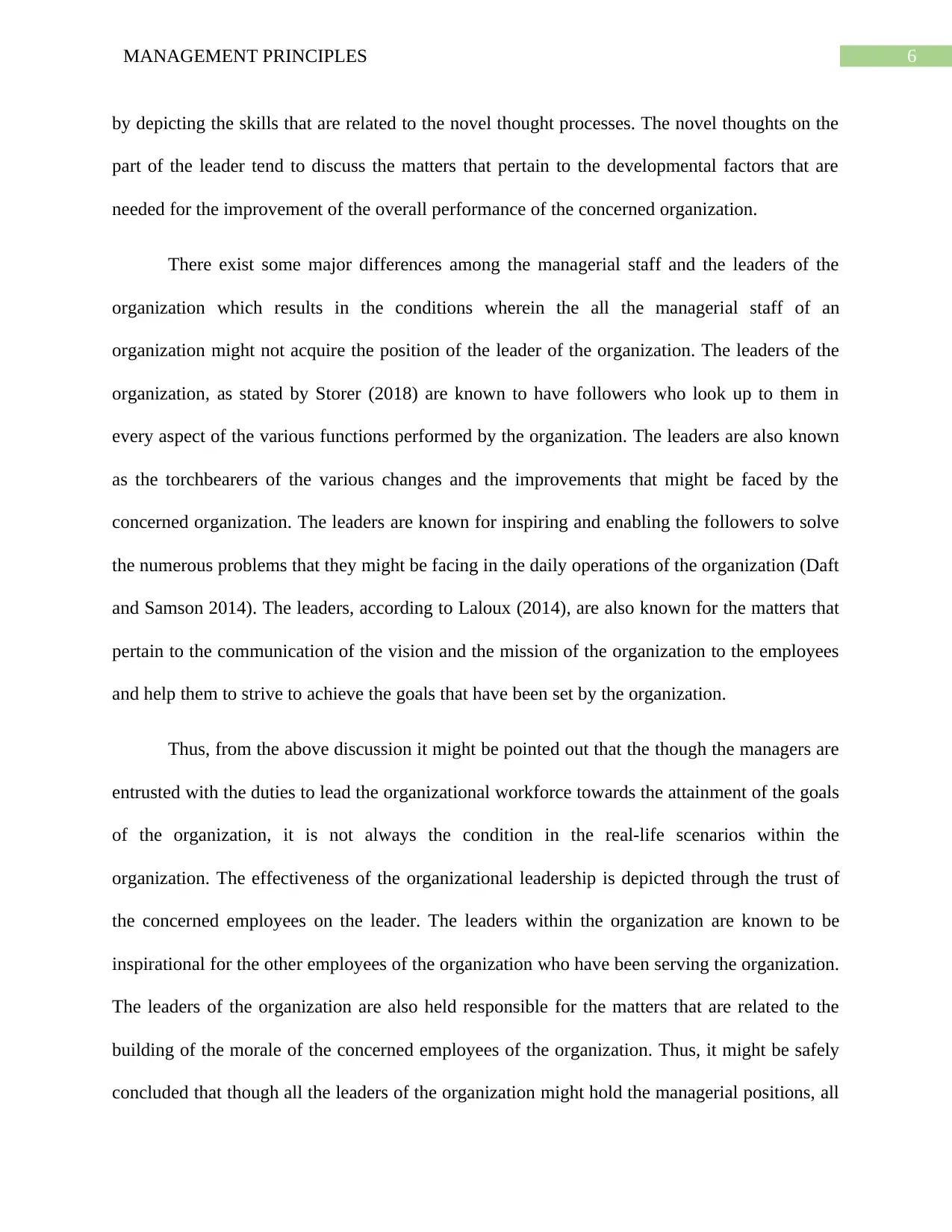
6MANAGEMENT PRINCIPLES
by depicting the skills that are related to the novel thought processes. The novel thoughts on the
part of the leader tend to discuss the matters that pertain to the developmental factors that are
needed for the improvement of the overall performance of the concerned organization.
There exist some major differences among the managerial staff and the leaders of the
organization which results in the conditions wherein the all the managerial staff of an
organization might not acquire the position of the leader of the organization. The leaders of the
organization, as stated by Storer (2018) are known to have followers who look up to them in
every aspect of the various functions performed by the organization. The leaders are also known
as the torchbearers of the various changes and the improvements that might be faced by the
concerned organization. The leaders are known for inspiring and enabling the followers to solve
the numerous problems that they might be facing in the daily operations of the organization (Daft
and Samson 2014). The leaders, according to Laloux (2014), are also known for the matters that
pertain to the communication of the vision and the mission of the organization to the employees
and help them to strive to achieve the goals that have been set by the organization.
Thus, from the above discussion it might be pointed out that the though the managers are
entrusted with the duties to lead the organizational workforce towards the attainment of the goals
of the organization, it is not always the condition in the real-life scenarios within the
organization. The effectiveness of the organizational leadership is depicted through the trust of
the concerned employees on the leader. The leaders within the organization are known to be
inspirational for the other employees of the organization who have been serving the organization.
The leaders of the organization are also held responsible for the matters that are related to the
building of the morale of the concerned employees of the organization. Thus, it might be safely
concluded that though all the leaders of the organization might hold the managerial positions, all
by depicting the skills that are related to the novel thought processes. The novel thoughts on the
part of the leader tend to discuss the matters that pertain to the developmental factors that are
needed for the improvement of the overall performance of the concerned organization.
There exist some major differences among the managerial staff and the leaders of the
organization which results in the conditions wherein the all the managerial staff of an
organization might not acquire the position of the leader of the organization. The leaders of the
organization, as stated by Storer (2018) are known to have followers who look up to them in
every aspect of the various functions performed by the organization. The leaders are also known
as the torchbearers of the various changes and the improvements that might be faced by the
concerned organization. The leaders are known for inspiring and enabling the followers to solve
the numerous problems that they might be facing in the daily operations of the organization (Daft
and Samson 2014). The leaders, according to Laloux (2014), are also known for the matters that
pertain to the communication of the vision and the mission of the organization to the employees
and help them to strive to achieve the goals that have been set by the organization.
Thus, from the above discussion it might be pointed out that the though the managers are
entrusted with the duties to lead the organizational workforce towards the attainment of the goals
of the organization, it is not always the condition in the real-life scenarios within the
organization. The effectiveness of the organizational leadership is depicted through the trust of
the concerned employees on the leader. The leaders within the organization are known to be
inspirational for the other employees of the organization who have been serving the organization.
The leaders of the organization are also held responsible for the matters that are related to the
building of the morale of the concerned employees of the organization. Thus, it might be safely
concluded that though all the leaders of the organization might hold the managerial positions, all
Paraphrase This Document
Need a fresh take? Get an instant paraphrase of this document with our AI Paraphraser

7MANAGEMENT PRINCIPLES
the managers might not possess the leadership qualities that are needed for the proper operations
within the concerned organization.
the managers might not possess the leadership qualities that are needed for the proper operations
within the concerned organization.
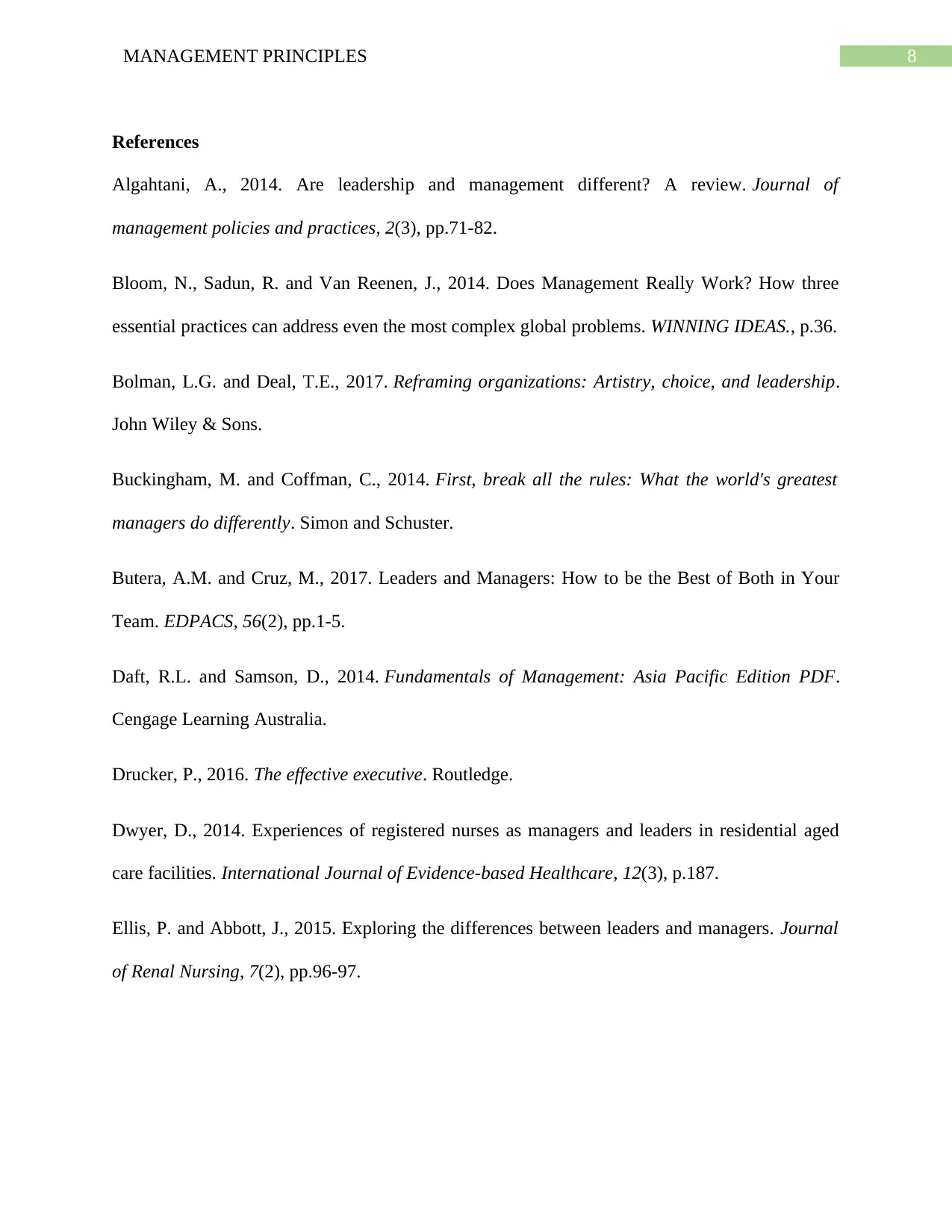
8MANAGEMENT PRINCIPLES
References
Algahtani, A., 2014. Are leadership and management different? A review. Journal of
management policies and practices, 2(3), pp.71-82.
Bloom, N., Sadun, R. and Van Reenen, J., 2014. Does Management Really Work? How three
essential practices can address even the most complex global problems. WINNING IDEAS., p.36.
Bolman, L.G. and Deal, T.E., 2017. Reframing organizations: Artistry, choice, and leadership.
John Wiley & Sons.
Buckingham, M. and Coffman, C., 2014. First, break all the rules: What the world's greatest
managers do differently. Simon and Schuster.
Butera, A.M. and Cruz, M., 2017. Leaders and Managers: How to be the Best of Both in Your
Team. EDPACS, 56(2), pp.1-5.
Daft, R.L. and Samson, D., 2014. Fundamentals of Management: Asia Pacific Edition PDF.
Cengage Learning Australia.
Drucker, P., 2016. The effective executive. Routledge.
Dwyer, D., 2014. Experiences of registered nurses as managers and leaders in residential aged
care facilities. International Journal of Evidence-based Healthcare, 12(3), p.187.
Ellis, P. and Abbott, J., 2015. Exploring the differences between leaders and managers. Journal
of Renal Nursing, 7(2), pp.96-97.
References
Algahtani, A., 2014. Are leadership and management different? A review. Journal of
management policies and practices, 2(3), pp.71-82.
Bloom, N., Sadun, R. and Van Reenen, J., 2014. Does Management Really Work? How three
essential practices can address even the most complex global problems. WINNING IDEAS., p.36.
Bolman, L.G. and Deal, T.E., 2017. Reframing organizations: Artistry, choice, and leadership.
John Wiley & Sons.
Buckingham, M. and Coffman, C., 2014. First, break all the rules: What the world's greatest
managers do differently. Simon and Schuster.
Butera, A.M. and Cruz, M., 2017. Leaders and Managers: How to be the Best of Both in Your
Team. EDPACS, 56(2), pp.1-5.
Daft, R.L. and Samson, D., 2014. Fundamentals of Management: Asia Pacific Edition PDF.
Cengage Learning Australia.
Drucker, P., 2016. The effective executive. Routledge.
Dwyer, D., 2014. Experiences of registered nurses as managers and leaders in residential aged
care facilities. International Journal of Evidence-based Healthcare, 12(3), p.187.
Ellis, P. and Abbott, J., 2015. Exploring the differences between leaders and managers. Journal
of Renal Nursing, 7(2), pp.96-97.
⊘ This is a preview!⊘
Do you want full access?
Subscribe today to unlock all pages.

Trusted by 1+ million students worldwide
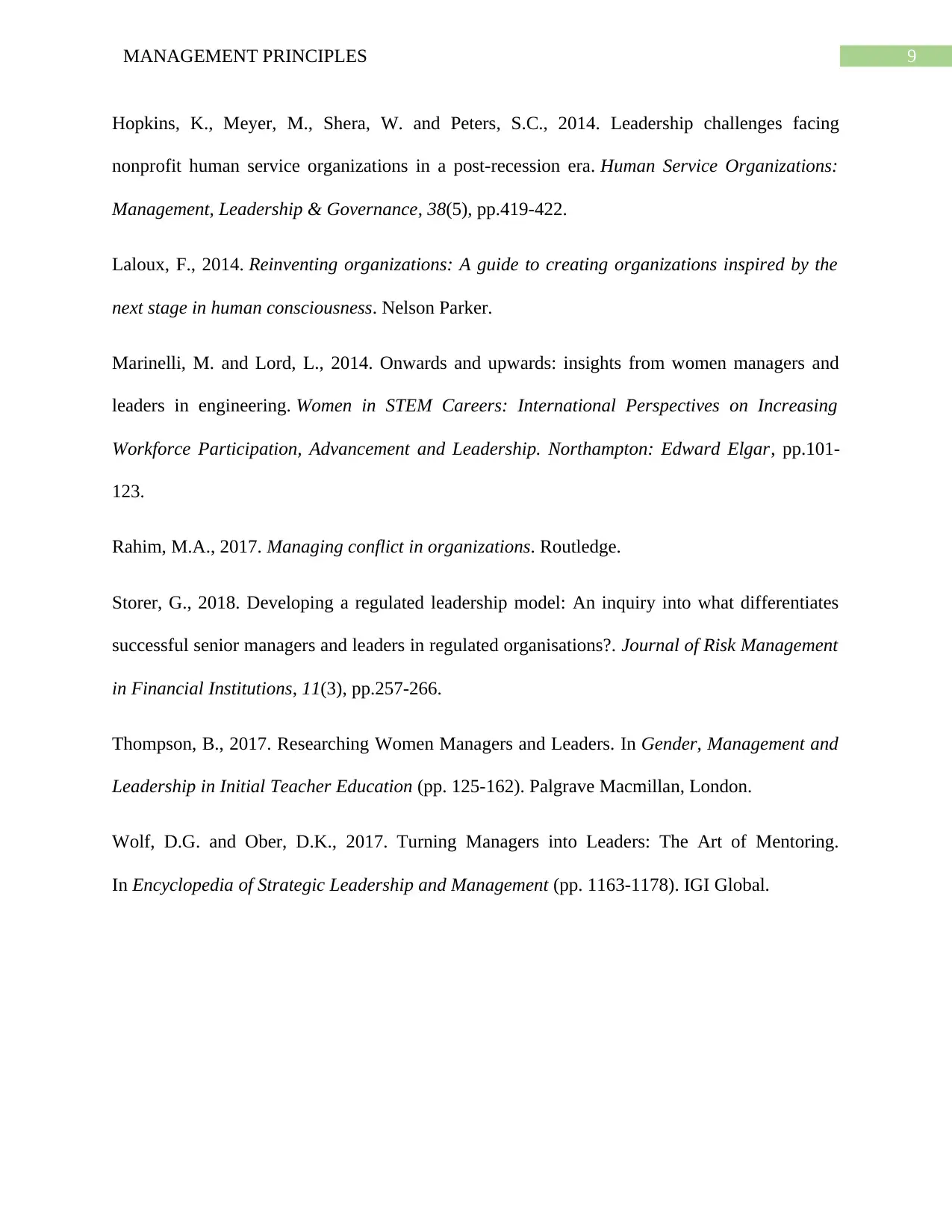
9MANAGEMENT PRINCIPLES
Hopkins, K., Meyer, M., Shera, W. and Peters, S.C., 2014. Leadership challenges facing
nonprofit human service organizations in a post-recession era. Human Service Organizations:
Management, Leadership & Governance, 38(5), pp.419-422.
Laloux, F., 2014. Reinventing organizations: A guide to creating organizations inspired by the
next stage in human consciousness. Nelson Parker.
Marinelli, M. and Lord, L., 2014. Onwards and upwards: insights from women managers and
leaders in engineering. Women in STEM Careers: International Perspectives on Increasing
Workforce Participation, Advancement and Leadership. Northampton: Edward Elgar, pp.101-
123.
Rahim, M.A., 2017. Managing conflict in organizations. Routledge.
Storer, G., 2018. Developing a regulated leadership model: An inquiry into what differentiates
successful senior managers and leaders in regulated organisations?. Journal of Risk Management
in Financial Institutions, 11(3), pp.257-266.
Thompson, B., 2017. Researching Women Managers and Leaders. In Gender, Management and
Leadership in Initial Teacher Education (pp. 125-162). Palgrave Macmillan, London.
Wolf, D.G. and Ober, D.K., 2017. Turning Managers into Leaders: The Art of Mentoring.
In Encyclopedia of Strategic Leadership and Management (pp. 1163-1178). IGI Global.
Hopkins, K., Meyer, M., Shera, W. and Peters, S.C., 2014. Leadership challenges facing
nonprofit human service organizations in a post-recession era. Human Service Organizations:
Management, Leadership & Governance, 38(5), pp.419-422.
Laloux, F., 2014. Reinventing organizations: A guide to creating organizations inspired by the
next stage in human consciousness. Nelson Parker.
Marinelli, M. and Lord, L., 2014. Onwards and upwards: insights from women managers and
leaders in engineering. Women in STEM Careers: International Perspectives on Increasing
Workforce Participation, Advancement and Leadership. Northampton: Edward Elgar, pp.101-
123.
Rahim, M.A., 2017. Managing conflict in organizations. Routledge.
Storer, G., 2018. Developing a regulated leadership model: An inquiry into what differentiates
successful senior managers and leaders in regulated organisations?. Journal of Risk Management
in Financial Institutions, 11(3), pp.257-266.
Thompson, B., 2017. Researching Women Managers and Leaders. In Gender, Management and
Leadership in Initial Teacher Education (pp. 125-162). Palgrave Macmillan, London.
Wolf, D.G. and Ober, D.K., 2017. Turning Managers into Leaders: The Art of Mentoring.
In Encyclopedia of Strategic Leadership and Management (pp. 1163-1178). IGI Global.
1 out of 10
Related Documents
Your All-in-One AI-Powered Toolkit for Academic Success.
+13062052269
info@desklib.com
Available 24*7 on WhatsApp / Email
![[object Object]](/_next/static/media/star-bottom.7253800d.svg)
Unlock your academic potential
Copyright © 2020–2025 A2Z Services. All Rights Reserved. Developed and managed by ZUCOL.




